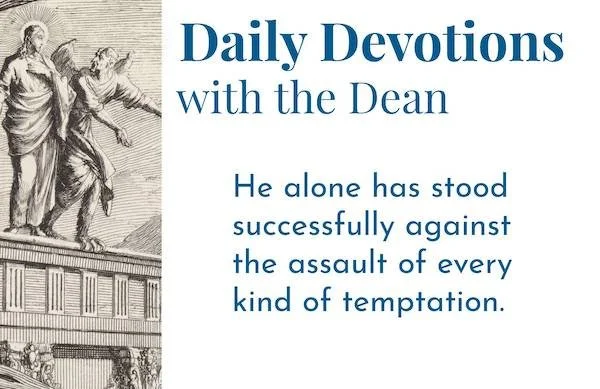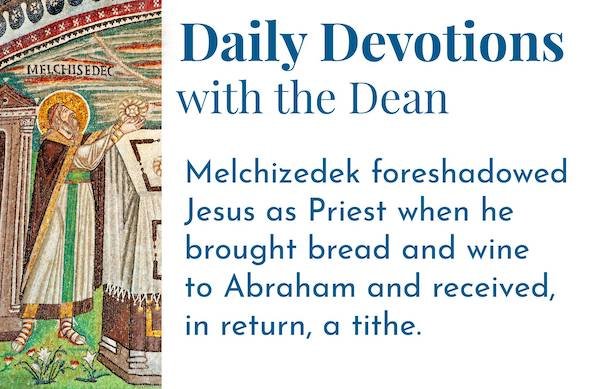Monday • 2/19/2024 •
Monday of 1 Lent, Year Two
This morning’s Scriptures are: Psalm 41; Psalm 52; Genesis 37:1–11; 1 Corinthians 1:1–19; Mark 1:1–13
This morning’s Canticles are: following the OT reading, Canticle 9 (“The First Song of Isaiah,” Isaiah 12:2–6, BCP, p. 86); following the Epistle reading, Canticle 19 (“The Song of the Redeemed,” Revelation 15:3–4, BCP, p. 94)
Welcome to Daily Office Devotions, where every Monday through Friday we explore that day’s Scripture readings, as given in the Book of Common Prayer. I’m Reggie Kidd. Thanks for joining me. This is Monday of the first week of Lent, a season of preparation for Holy Week, and we are in Year 2 of the Daily Office Lectionary.
Genesis 37 and envy. Sin is a stubborn opponent. Envy (resentment at the perception of someone else’s advantage) is especially so. Adam and Eve fall because they envy God’s advantage in knowing good and evil in a way they do not. Cain falls because his brother’s sacrifice is favored over his own. When Isaac’s second son Jacob realizes that he is God’s choice for the blessing normally reserved for the first son, Jacob fails to show regard for the temptation to envy that his older brother Esau faces. Instead, Jacob conspires to seize the inheritance by deceit, virtually insuring the envious wrath of his older brother. Jacob is on the receiving end of envy when Jacob’s uncle Laban resents the bounty that God bestows upon Jacob’s sheep-breeding practices.
Throughout, God gradually draws Jacob into a closer relation to himself; but, sadly, Jacob remains blind to the deadly power of envy. “Now Israel (Jacob) loved Joseph more than any other of his children, because he was the son of his old age; and he had made him a long robe with sleeves. But when his brothers saw that their father loved him more than all his brothers, they hated him, and could not speak peaceably to him” (Genesis 37:3–4). There’s culpability all around: the older brothers who fall into envy’s trap, the younger brother whose ill-advised dream disclosure offers no mitigating language, and, of course, the father who has not spread paternal affection equitably.
We’ve all known, I’m certain, what it is to feel that others get attention and affection at our expense, and we know it can bring ugly things to the surface. Thank God for not letting us off the hook! And thank God for a Lenten season that allows us to name the evil.
Image: Rijksmuseum, CC0, via Wikimedia Commons
1 Corinthians 1 and pride. Pride (feeling superior to others by virtue of one’s own real or perceived advantage over them) is also a stubborn opponent. It is to an especially prideful community of Christians that Paul writes 1 Corinthians. God has peculiarly blessed them “in speech and knowledge of every kind” so that they “are not lacking in any spiritual gift” (1 Corinthians 1:5,7). So much so that Paul feels he must remind them that they are called “together with all those who in every place call on the name of our Lord Jesus Christ, both their Lord and ours” (1 Corinthians 1:2b). They’re proud of their prophecies, their tongues, their miracles, their spiritual mentors, their wealth, their liberty of conscience. I’ve been part of churches that felt like I was among the Corinthians, among people who imagined themselves especially kissed by God with gifts and perspectives that set them apart as special. That sense of superiority can be deadly. Throughout this letter, Paul will be reminding the Corinthians that everything they have, they have because of “the grace of God that has been given you in Christ Jesus” (1 Corinthians 1:4).
During this Lenten season, I am grateful for the call to “self-examination and repentance; by prayer, fasting, and self-denial, and by reading and meditating on God’s holy Word” (BCP, p. 265). I am grateful for Lent’s reminder that God grants his favor despite our lack of merit.
Mark and our Christus Victor. Happily, we are not left to attempt to kill sin by ourselves. What is especially encouraging in a backdoor way is reading about how the deadly sins of envy and pride afflict faithful followers, like Jacob/Israel and the Corinthian Christians. We have only one Champion, the Lord Jesus Christ. He alone has stood successfully against the assault of every kind of temptation. And while we would, just like Adam and Eve, fail in a garden of delight, he has succeeded. That victory was on our behalf, during 40 days in a wilderness of desolation. This Lenten season is a new opportunity to entrust ourselves to his care, his forgiveness, and his strengthening power.
Collect of the Day: The First Sunday in Lent. Almighty God, whose blessed Son was led by the Spirit to be tempted by Satan; Come quickly to help us who are assaulted by many temptations; and, as you know the weaknesses of each of us, let each one find you mighty to save; through Jesus Christ your Son our Lord, who lives and reigns with you and the Holy Spirit, one God, now and for ever. Amen.
Be blessed this day,
Reggie Kidd+













